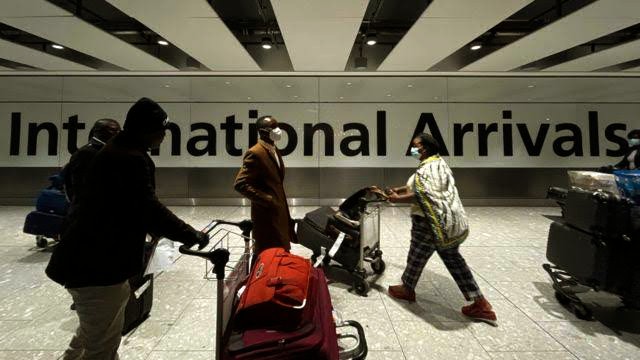
JAPA: Easiest Way to Relocate Abroad

Japa, a Yoruba locution meaning “to leave for greener pastures,” is deeply rooted in the aspirations of young Nigerians seeking to permanently emigrate. Consequently, this term “japa” has become synonymous with the pursuit of better opportunities abroad. Moreover, the widespread use of Japa underscores the socio-economic challenges in Nigeria, relocate and seek improved living conditions elsewhere. This article features the easiest way to japa and relocate to the UK, USA and Canada.
JAPA: Easiest Way to Relocate to the UK from Nigeria

To Japa (relocate) to the United Kingdom from Nigeria involves several practical steps and considerations, but with careful planning, it can be a manageable and rewarding experience. Whether for work, study, or personal reasons, understanding the process—from visa applications to settling in—is crucial. This guide outlines these steps comprehensively, offering a roadmap for a smooth transition.
Understanding Visa Requirements
The first crucial step in relocating to the UK is understanding the visa requirements. The United Kingdom operates a points-based immigration system that categorizes visas based on the purpose of relocation, such as work, study, family reunion, or investment. For instance, if you’re relocating for work, you will likely need a Tier 2 (General) visa, which requires sponsorship from a UK employer. Thoroughly researching and preparing for these requirements ensures compliance and avoids delays in the application process.
Researching Job Opportunities
Once you’ve chosen your visa category, researching job opportunities in the UK is crucial. First, use LinkedIn, Indeed, and recruitment agencies to find roles and potential employers who sponsor visas. Additionally, networking and personal connections can uncover unadvertised opportunities. Ultimately, securing a job offer from a UK employer willing to sponsor your visa is essential for your relocation.
Applying for a Visa
Once you secure a job offer, the next step is to apply for your visa. This involves completing an online application on the UK Visas and Immigration website. Additionally, you’ll need to submit required documents, attend biometric appointments, and possibly provide proof of funds and a tuberculosis test certificate. Consulting with immigration advisors ensures your application meets all requirements.
Securing Accommodation
Finding suitable accommodation in the UK is crucial for a successful relocation. Options include rental apartments and purchasing property. Websites like Rightmove and Zoopla offer listings and price comparisons. Consider proximity to work or study, transportation access, local amenities, and budget when choosing. Starting your search early and exploring various neighborhoods will help you find accommodation that meets your preferences.
Understanding Healthcare Services
Accessing healthcare in the UK is crucial. The NHS provides extensive medical services, so registering with a local GP upon arrival is advised to obtain an NHS number. This number is essential for accessing primary healthcare services such as consultations, prescriptions, and specialist referrals. Emergency medical care at NHS hospitals is free, but dental care and other services may involve fees. Understanding the NHS registration process ensures timely access to healthcare when needed.
Adapting to Cultural Differences
Relocating to a new country involves embracing cultural diversity. Moreover, the UK is known for its multicultural society, rich in traditions and lifestyles. Learning about British culture, etiquette, and social norms can ease integration and foster comfort. Furthermore, engaging in local events, clubs, and connecting with people from diverse backgrounds enriches your experience and broadens perspectives.
Navigating Financial Considerations
Effective financial management is essential when moving to the UK. You’ll need to open a UK bank account for salary deposits, bill payments, and daily expenses, typically requiring proof of identity and UK address. Consider international transfer fees and exchange rates when moving funds from your Nigerian account to minimize costs. Budgeting for initial expenses like rent, utilities, groceries, and transportation helps adjust to the UK’s cost of living and avoids financial stress during relocation.
Networking and Building Connections
Networking is vital for building a successful career and social life in the UK. To begin, engage with professionals in your industry. Additionally, attend networking events and join professional associations or online forums to expand your network and access job opportunities. Moreover, building relationships with colleagues, classmates, and community members provides support and guidance, thereby enhancing both career prospects and personal growth.
Seeking Legal Advice
Navigating UK immigration laws from Nigeria can be complex. Immigration lawyers specializing in UK immigration provide crucial guidance on visa applications, eligibility criteria, and compliance with laws. They help resolve issues and uncertainties, ensuring a smoother relocation process and clarity on residency rights in the UK.
Conclusion
Relocating from Nigeria to the United Kingdom involves handling visas, job search, housing, healthcare, cultural adjustment, finances, networking, and legal advice. Following these steps and seeking help when necessary can simplify your move and ensure a smooth transition. Despite challenges, thorough preparation, proactive planning, and a positive attitude will lead to a successful relocation experience.
JAPA: Easiest Way to Relocate to USA from Nigeria

To Japa (relocate) to the United States from Nigeria involves a series of steps that require careful planning and understanding of the process. Whether you are moving for work, education, or to join family, navigating through visa applications, cultural adjustments, and administrative tasks can make the transition smoother and more manageable.
1. Research and Planning
Before starting your move to the USA, it’s essential to thoroughly research the available visa options for Nigerians. These include work visas (such as the H-1B for skilled workers), student visas (F-1 or J-1 for academic studies), family-sponsored visas (like IR and CR for relatives of U.S. citizens or permanent residents), and diversity visas (DV Lottery for individuals from countries with low immigration rates to the U.S.). Understanding these options will help you choose the best visa for your needs.
Understand the eligibility, application process, and documentation needed for each visa type. Work visas require a job offer from a U.S. employer. Student visas need acceptance to a U.S. school and proof of financial support. Family visas require proof of your relationship with a U.S. family member.
Research early and thoroughly to ensure you choose the visa category that best suits your situation and that you are well-prepared to meet all requirements before submitting your application.
2. Visa Application Process
Once you’ve chosen the right visa category, carefully gather all required documents: proof of funds for your stay, educational credentials, job offers (if relevant), and documents showing your relationship with your U.S.-based family member (if applying for a family-sponsored visa).
Note that visa application processes can be lengthy and may involve interviews at a U.S. embassy or consulate in Nigeria. Be prepared to provide detailed information about your background, intentions in the U.S., and ties to Nigeria to demonstrate your eligibility for the visa.
Upon submission, monitor your application progress closely and promptly respond to any requests for additional information or interviews to avoid processing delays.
3. Financial Planning
Moreover, relocating to the USA involves significant financial considerations beyond visa application fees. Budget for travel expenses to the U.S., accommodation costs upon arrival, and possibly initial living expenses until you secure employment or settle into a routine.
Create a financial plan that includes a contingency fund for unexpected expenses to alleviate some of the stress associated with moving to a new country. Research cost-of-living estimates for your intended U.S. destination, explore potential job opportunities or sources of income, and identify affordable housing options that fit your budget.
4. Housing and Accommodation
Additionally, securing suitable housing in the USA is crucial for a smooth transition. Research different neighborhoods, rental prices, and amenities in your chosen city or town. Websites like Craigslist, Zillow, and local real estate agents can be invaluable resources for finding accommodation that meets your needs and budget.
When evaluating housing options, consider factors such as proximity to work or school, access to public transportation, safety, and community amenities. Additionally, contact landlords or property managers in advance to inquire about rental availability, lease terms, and required documentation.
5. Cultural Adjustment and Integration
Moving to a new country means adjusting to new cultures, social norms, and daily life. Prepare for differences in language, food, etiquette, and interactions. Engage with local communities, cultural associations, and community events to ease your transition and connect with others in your new home.
Take time to learn about American customs, traditions, and local laws to avoid misunderstandings and navigate daily life more comfortably. Furthermore, embrace opportunities to explore the diverse cultural landscape of the U.S. and, consequently, celebrate the unique perspectives that each community offers.
6. Healthcare and Insurance
Lastly, understanding the healthcare system in the USA is essential for maintaining your well-being during your stay. Research healthcare providers in your area, explore insurance options (private or employer-provided), and familiarize yourself with how to access medical care in case of emergencies or routine appointments.
Health insurance is mandatory for most visa holders in the USA, so enroll in a plan that meets the requirements of your visa category and provides comprehensive coverage for medical services, prescriptions, and preventive care.
Conclusion
In conclusion, relocating from Nigeria to the USA requires careful planning, from visa applications to cultural adaptation and financial preparation. Follow this comprehensive guide and utilize available resources to ensure a successful transition.
Each step in the relocation process is crucial to successfully moving and integrating into your new life in the United States. Conduct thorough research, prepare necessary documents, and embrace cultural differences to navigate challenges with confidence and optimism.
JAPA: Easiest Way to Relocate to Canada from Nigeria

To Japa (relocate) to Canada from Nigeria has become increasingly appealing due to Canada’s high quality of life, diverse culture, and numerous opportunities for education and employment. The process to Japa may seem daunting, but with the right information and preparation, you can make it easier. This article provides a detailed guide on the easiest way to Japa (relocate) to Canada from Nigeria, emphasizing various immigration programs, necessary preparations, and essential tips.
Understanding Canadian Immigration Programs
First and foremost, you need to understand the different immigration pathways Canada offers. Moreover, these programs cater to various needs and qualifications, allowing you to choose the one that best fits your situation.
1. Express Entry Program
- Overview: The Express Entry Program ranks among the most popular and straightforward ways to immigrate to Canada. It targets skilled workers who wish to live and work in Canada as permanent residents.
- Eligibility: To qualify, you must meet the criteria of one of the three economic immigration streams: the Federal Skilled Worker Program (FSWP), the Federal Skilled Trades Program (FSTP), or the Canadian Experience Class (CEC). The FSWP often applies most to Nigerians with professional work experience.
- Process: Create an online Express Entry profile where you provide details about your skills, work experience, language ability, education, and other personal information. Your profile then receives a score using the Comprehensive Ranking System (CRS). Candidates with the highest scores receive an Invitation to Apply (ITA) for permanent residence.
2. Provincial Nominee Program (PNP)
- Overview: The PNP allows Canadian provinces and territories to nominate individuals who wish to immigrate to Canada and settle in a particular province.
- Eligibility: Each province has its own set of criteria and streams, typically targeting specific skills or occupations in demand within the region.
- Process: First, apply to the province for a nomination. If the province nominates you, apply for permanent residence through the Express Entry system or directly to Immigration, Refugees and Citizenship Canada (IRCC).
3. Student Visa to Permanent Residency
- Overview: Many Nigerians choose to relocate to Canada initially as international students. Canada’s educational institutions are highly respected, and studying in Canada can serve as a stepping stone to permanent residency.
- Process: Apply and gain acceptance into a Canadian Designated Learning Institution (DLI). After completing your studies, you may become eligible for a Post-Graduation Work Permit (PGWP), allowing you to gain Canadian work experience. This experience can then support your application for permanent residency through the Canadian Experience Class within the Express Entry system.
Preparing Your Application
Moreover, thorough preparation of your application increases your chances of success. Below are critical steps to ensure a smooth process:
1. Educational Credential Assessment (ECA)
- Obtain an ECA to verify that your Nigerian educational credentials match Canadian standards. This requirement applies to most immigration pathways, especially the Express Entry Program.
2. Language Proficiency Tests
- Take approved language tests such as the IELTS for English or the TEF for French. High scores in language proficiency significantly improve your CRS score in the Express Entry system.
3. Gather Necessary Documents
- Collect all required documents, including passports, educational certificates, work experience letters, police clearance certificates, and medical exams. Having these ready will expedite your application process.
4. Create a Strong Express Entry Profile
- Ensure your Express Entry profile is complete and accurate. Highlight your skills, experience, and qualifications effectively to improve your CRS score.
Tips for a Smooth Relocation
In addition, consider these practical tips to make your relocation process smoother:
1. Research and Plan Ahead
- Research the city or province you plan to move to. Understand the job market, cost of living, climate, and cultural aspects to better prepare for your new life in Canada.
2. Financial Preparation
- Ensure you have sufficient funds to cover your relocation and initial settlement expenses. Canada requires proof of funds to ensure that you can support yourself and your family during your initial period in the country.
3. Seek Professional Help
- Consult with a certified immigration consultant or lawyer for valuable guidance and help navigating the complexities of the immigration process.
4. Network with Other Immigrants
- Join online forums, social media groups, or local community organizations of Nigerians in Canada. Networking can provide support, advice, and valuable insights from those who have successfully relocated.
Conclusion
In conclusion, relocating to Canada from Nigeria requires careful planning and adherence to immigration guidelines. Understanding the immigration programs, preparing a thorough application, and following practical tips can ease your transition. However, with the right approach, you can start a new chapter in one of the world’s most desirable countries.
Related Topics
Best Countries to Relocate to: Top Destinations for Living, Working and Thriving Abroad
How to Relocate to the UK: All You Need To Know
UK Visa Application: All You Need To Know


